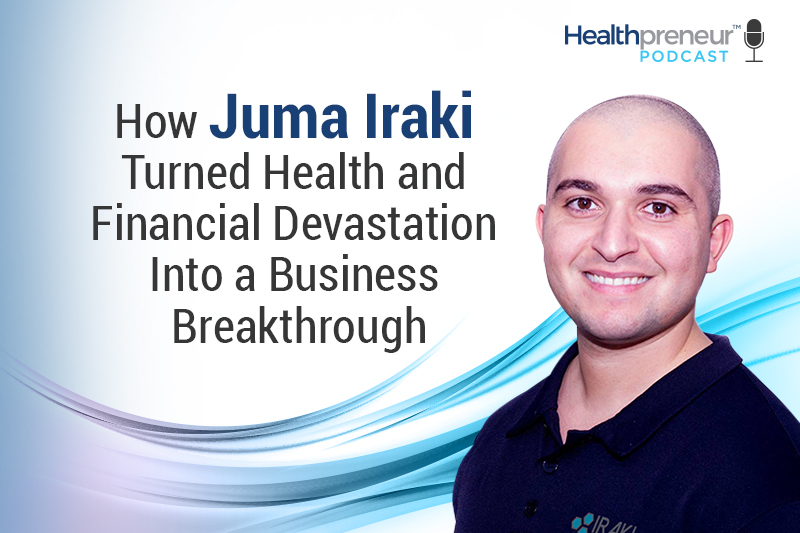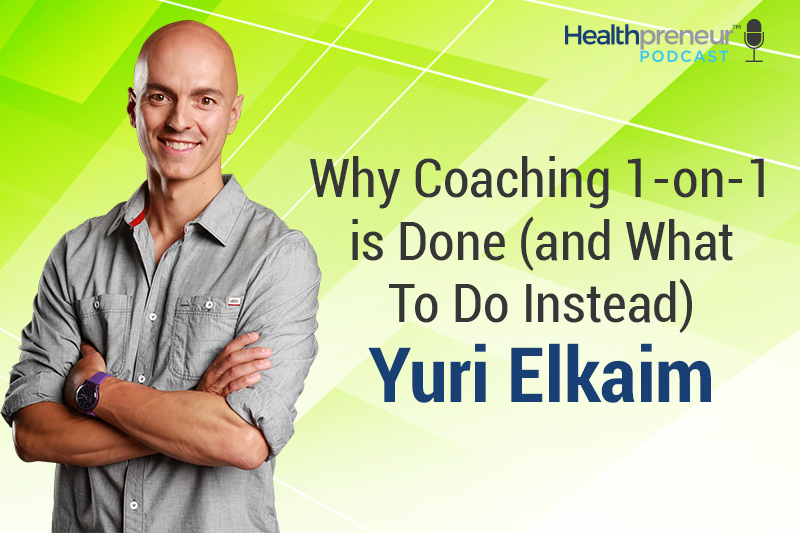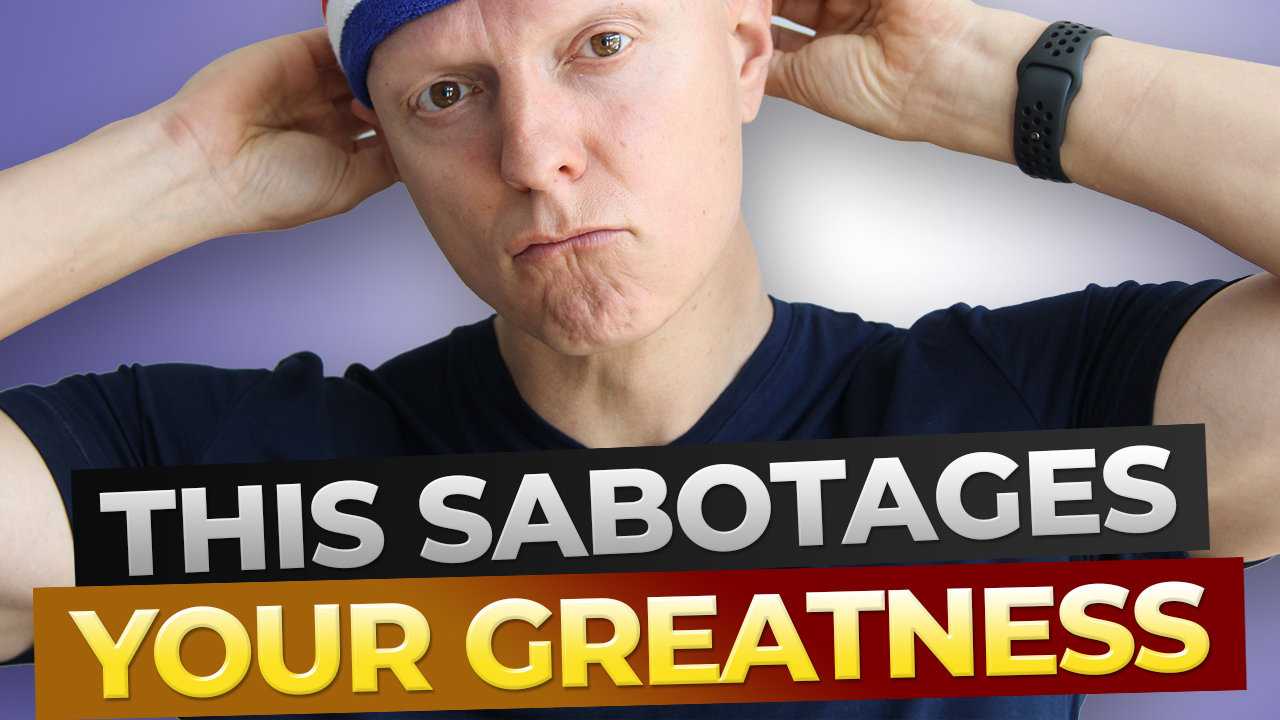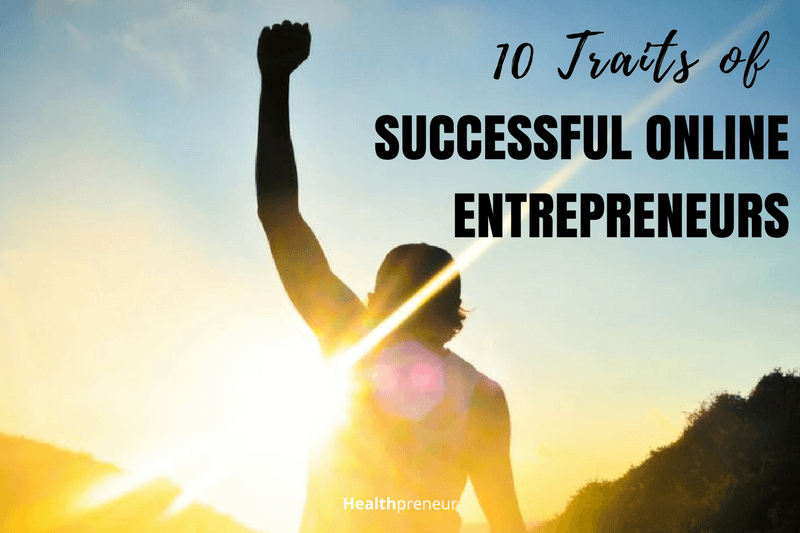How Juma Iraki Turned Health and Financial Devastation Into a Business Breakthrough

This is episode 65 of the Healthpreneur Podcast, and today we are going to be talking with Juma Iraki! Juma is the owner and operator of Iraki Nutrition, a sports nutritionist, and business consultant for the top supplement company in Norway. He’s the head Sports Nutritionist for the National Judo Federation of Norway and a die-hard soccer fanatic.
In addition to helping people through his speaking, consulting, and counseling, Juma has an incredible story that is sure to inspire anyone who knows what it feels like to hit rock bottom. Despite the hurdles he’s lept to get to where he is today, Juma has structured his life in a way that allows for his top priorities to stay top of mind.
If you think this episode may not be for you—think again. Juma gives excellent insight on struggles that face ALL Healthpreneurs, including time management, prioritizing, automation, and cold, hard grit. I you’ve ever felt overwhelmed because your to-do list wasn’t getting any smaller or you haven’t spent enough time with your kids, tune in. The nuggets of wisdom in this episode are truly inspiring and immediately actionable.
In this episode Juma and I discuss:
- Juma’s journey from illness and struggle to success and freedom.
- Mindset and drive.
- Overcoming obstacles and the power of automation.
- Freedom and putting family first.
- Focus
- Balance equals success.
2:00 – 13:00 – Juma’s background and tough beginnings
13:00 – 17:00 – The mindset and drive necessary to bounce back from obstacles
17:00 – 23:00 – Overcoming obstacles, finding opportunities, and discovering automation
23:00 – 26:00 – Skills for lasting success
26:00 – 36:00 – The Rapid 5
Transcription
Welcome to episode 65 of the Healthprenuer Podcast. Thank you for being a loyal subscriber if you’ve been with me since day one. If you’re just jumping on the boat now, it’s all good. Better late than never, right?
We have lots of great interviews to inspire you to keep you going no matter what life throws your way. You have an amazing message when it comes to health, fitness, or nutrition that can transform people’s lives. I believe that people need to know better, so I’m here to help you take your business and message to the next level so that you can impact those people and live the life you deserve.
Does that sound good? Does that sound like something you’d like or are currently living? If so, that’s great. You’re in the right place. This is the place for us Healthpreneurs to hang out.
Today, we’ve got a really cool guest, Juma Iraki, and he is joining us all the way from Norway. That’s a first! We’ve never had anyone on the show nor do I know anyone from Norway, so I’m excited.
Juma is a certified personal trainer, holds a Bachelor degree in Nutritional Sciences, has completed his IOC diploma in Sports Nutrition through the International Olympic Committee, and is currently pursuing his Master’s degree in Sports Nutrition at the University of Sterling in Norway. He’s the CEO of Iraki Nutrition AS and Head of Nutrition at AFPT where he lectures in Sports Nutrition. He also works as a business consultant for one of the largest supplement companies in Norway, and is the head Sports Nutritionist for the National Judo Federation in Norway.
Juma’s going to share an amazing story about how he built his company, how it hit rock bottom, and what happened after that. I’m not going to spoil the surprise. Without any further ado, let’s welcome Juma onto the show.
***********************************************************
***********************************************************
Juma, welcome to the Healthpreneur Podcast. How’s it going?
Juma: Hi Yuri. Thank you so much for having me. It’s going great. What about you?
Yuri: It’s going very well, thank you. I’m excited to have you on because you’re doing cool things in the nutrition space with your business and everything you’re sharing, but you’re also joining us from Norway, which is a first for the podcast.
What’s something that people don’t know about you that you’re happy to share?
Juma: Well, most of the information about me is available on my website, but if I were to mention something that some people don’t know about me, it’s that I’m a huge soccer fan.
Yuri: Nice.
Juma: An extreme soccer fan. I follow a team called Newcastle United in the north of England, and I’ve been following them for 24 or 25 years.
My dad was at a conference in Dublin and came home with a Newcastle shirt for me, and from that day on I’ve been watching and following them. It’s been an interesting journey with ups and downs, and lately it’s been more downs than ups, but hopefully that will change in the future.
Yuri: I remember the good old Alan Shearer days.
Juma: Yeah, those were the good days. We really need an iconic number nine, a striker, in our club, but we’ll see.
There’s some talk now about golf money being invested into the club, so we might be up for sale. There might be a takeover by the end of the year. Hopefully that will happen and we’ll see how that goes.
Yuri: Yeah, it’s amazing. I played pro soccer for a number of years and love soccer fanatically. To see the English partnership and how it’s grown in 10 years from where it was when I was in my teens is crazy. It’s been pretty cool to see the changes with all the Asian money that’s come in and all those new owners.
It’s always cool to connect with people who love the sport. Your dad brought you home a jersey and that’s how you connected to the club. That’s a very nostalgic connection.
So, IIraki Nutrition is the company. What’s the journey been like? How and why did you get into doing what you do?
Juma’s background and tough beginnings
Juma: I got my Bachelor’s degree in Nutrition Science in 2012, and a couple of months before I graduated, I started to think about what I was going to do when I finished my degree. I decided to start my own company, set up an office, and do nutrition consulting and see how that went.
I started a month after I graduated, and to be honest, it didn’t go as planned. There were basically no clients and it was really difficult to get clients. I was working 16-18 hours a day and struggled to make money.
A year after that, my son was born. I had been struggling with some intense stomach pain on and off for six or seven years. My wife told me, “You know what? You’ve been complaining so long about this. Maybe you should go see another doctor and find out if there’s something you can do about it.”
I went to another doctor, and I found out that I had Crohn’s disease and it hadn’t been treated for the past six or seven years.
Unfortunately, that caused a lot of scar tissue in my GI system, so I had to have surgery and it didn’t go well. I had complications two or three days after. I spent the next year away from work because I needed an additional nine more surgeries to fix the complication that occurred. In total I did 10 surgeries that year.
Here in Norway, if you’re employed you get money if you’re ill or sick. If you’re self-employed, you don’t really get that much. You get about a 65% average of what you earned the last three years, and since I hadn’t been running my company for that long, I basically had no income.
Luckily we had savings. If it weren’t for the savings, we would have ended up on the street, losing everything. That was a rough experience, especially since I’m really competitive and determined. To be placed in a situation where I felt so vulnerable and unable to support my family was tough.
Company-wise, my company hit rock bottom. Everything I did the last year was completely wasted. I had nothing to come back to. I wondered if I should give it another push, or find another job to support my family.
I was encouraged by my family to give it another go, and I set up a goal that if I were to make the same income that I was making in the next year, then I would continue. I really don’t know what happened.
Prior to starting the company I had been writing a lot of articles for different websites here in Norway regarding training, nutrition, and supplementation. Three months after I did my second push with the company, I signed three major contracts with big companies here in Norway.
One of them was Proteinfabrikken, the biggest supplement company here in Norway. Another one was with the Academy for Personal Training in Norway. Recently, I landed a contract with the Norwegian Judo Federation.
I basically do three things in my company here in Norway: Guest speaking and lecturing on sports nutrition for Academy for Personal Training, business consulting for the supplement company, and training and nutrition counseling for national Judo athletes.
It’s amazing how I was at rock bottom and within the next three months everything just flipped the other way. I think the effort I put into it prior to that that accumulated during that time.
In 2015, since things were going well, I converted my self-employed company into a stock-based company where I could employ myself and have the same benefits as everyone else in Norway. I haven’t looked back after that. The main reason was because I never want to go through what I went through ever, ever again.
It’s one thing to have the disease and struggle with your health, but a whole other to also experience the stress that you’re about to lose everything and not be able to support your family. That was major stress factor for me.
Yuri: I can only imagine. Thank you for sharing that. No one would want to go through a similar situation just from a health perspective, let alone all the financial stress. Amazingly, you pulled through all that. On a day-to-day basis, there must have been periods of self-doubt, but was there a voice in your head that said, “I can do this. We can make this happen.” What was that mindset that helped you get through that tough time?
The mindset and drive necessary to bounce back from obstacles
Juma: I think it’s how I was raised by my parents and how I grew up. I was a really stubborn kid. If I wanted something or I set a goal, I didn’t stop until I achieved that goal. I played soccer for 10 years and I wanted to be the captain of my football team. So I just kept at it for several years and finally I was the captain of my team.
I always set a goal to be the boss at every company I ever worked with. But what I really struggled with when working for other people was that as soon as I was the boss of the company, I really didn’t feel I could go anywhere else. That’s also why I started my own company, because then there are no limits.
My driver was that I had to make it work to support my wife and kid. There was no option to fail. That has kept me on my toes and helped me structure my day. That experience alone has helped me be more efficient with how I work.
I spend more time being productive because in the back of my head, I always look forward to spending a lot of time with my kid and my wife. As soon as I catch myself doing something that I shouldn’t do work-wise, I remind myself that the more time I do that, the less time I have with my family. Because I travel a lot and have a hectic schedule during some parts of the year, that’s what I always look forward to.
I think my determined mindset has always been there. My life motto is even tattooed on my body. It’s a Latin phrase that says, “Aut viam inveniam aut faciam,” which basically means “I shall either find a way or make one.”
It’s an old quote from Hannibal. He came to a lake with his soldiers and elephants and they told him that there was no way to cross it. He told them that they’ll find a way, or make their own. That’s really stuck with me. I don’t like to look at obstacles; I always try to find a solution.
Yuri: That’s awesome. I love entrepreneurship because you’re forced to be in positions where you put that mindset to use, which is tremendous.
During this journey, besides the story that you shared with us earlier, what has been one of the obstacles that you’ve dealt with in the business as it’s continued to grow? How did you overcome those obstacles and what lessons did you learn?

Overcoming obstacles, finding opportunities, and discovering automation
Juma: When I first started, I noticed that I was spending a lot of time doing things that could be automated, which took up a lot of my time. One of the things was accounting. I put that away several years ago now, so I have an accountant that does everything for me. I don’t have to think about that.
All my online client systems have now been automated. When I look back, I wish that I had spent more time at the start figuring out how I could do these things. Then I would have been much more productive early on.
One of the main things here in Norway about being a sports nutritionist is that you really have to have the right connections. You have to be stubborn and try every option that you have. If you look in the UK, there’s much more work for sports nutritionists because a lot of the professional teams have sports nutritionists on their staff.
In Norway, on the other hand, not a lot of clubs are willing to spend money on a sports nutritionist. I figured out early on that only nutritional consulting wouldn’t work.
It’s not like a physical therapist where people need to see you regularly. They’ll see you once, have a followup two weeks after, and then maybe meet you once a month after that. The amount of clients that you have to have needs to be big.
I started to look at other options besides nutritional consulting. I learned I could also work in guest speaking, holding lectures, and writing articles. I could work in the supplement industry.
One of the reasons why I think things worked out so well for me compared to others, is that I tried to see opportunities in bigger areas than a lot of other people did. They only focused on just doing the nutritional consulting thing, and like I said, you really need to have a huge amount of clients to have that as your full-time job.
Yuri: That makes sense. You looked at the opportunities as opposed to the obstacles and thought creatively about how to solve those potential issues, which is awesome.
Juma: I’d like to mention one strategy that I use. If I set a goal to work with a company, for example, I will tell them something that they need to improve on. I’ll then follow that up with how the problem can be solved.
When you do that, you’re making work for yourself. With the supplement company, I got the opportunity to go to their warehouse and speak to a lot of the people there. I set a goal to locate the CEO, chat with him, and be completely honest with what I see from the outside and how I potentially could help them.
That’s how the relationship with the supplement company started. I was completely honest with them about what I thought they were doing right and what they were doing wrong. I also told them how I would do it differently and, since it was my area of expertise, I could help them with it.
10 minutes later, they invited me to lunch and the rest is history. We’ve had a great relationship for the last four years now.
One of the things I also tell a lot of people is that you need to make your own opportunities as well. There’s no shame in asking. Many people are afraid to ask for collaboration with a company because they’re afraid to get rejected.
But that’s how it is. Sometimes you get a no and sometimes you get a yes, but you’ll never figure that out if you don’t ask.
Yuri: There’s a really good lesson there too, for everyone listening. You went to the company and said, “Here’s an issue and here’s how you can solve it.” You were demonstrating that you could help them by helping them and giving them some type of result before even asking for anything.
This is the premise of building any successful relationship. Giving, giving, giving. Demonstrate what you’re able to do before you ask for anything. As you mentioned, within 10 minutes they wanted to have lunch with you. That was a good example of that whole thing playing out.
What do you think is the number one skill entrepreneurs must possess for lasting success?
Skills for lasting success
Juma: A skill that is really important is being structured and organized. But you also must have respect for yourself and your time. Find systems to organize and set your priorities.
It’s not about the amount of hours you’re working. It’s about how much quality is in the work that you do. For me, I came to a point in my business where I thought, “Is more money going to make me happier, or am I satisfied with what I have now?”
I feel I’ve come to a point where I value my free time much more. Being a business owner and entrepreneur, I love the freedom to do what I want, when I want. There isn’t a set hour where I need to be someplace.
Even though I have freedom, I still structure my day. I split up when I work. I’ll wake up in the morning at 6:00, work from 7:00-12:00, go to the gym from 12:00-2:00. Then I’ll eat dinner with my wife and kids, spend some time with them, then I usually have some small things to do like emails, replies, or something like that. Then I’m done for the day.
A couple of years ago I found that I was much more productive when I split up my day that way. I do the heavy tasks in the morning, have a break to go to the gym and spend time with my family, then I do the autopilot work, as I call it, which doesn’t require as much brain power.
Yuri: It’s a discovery process. You learned how you best work and found that you do your best work in the morning. I love how you said earlier that you look at your day and recognize, “If I start goofing off, I’m not going to have as much time to be with my family.”
Having that perspective and awareness is really important.
I tell everyone, “If you want to be more productive, just have kids.” It forces you to really prioritize things. I’ve got three boys and they’re in school from 9:00 until 3:00, so that’s my work time. When 3:00 comes, everything shuts down. Otherwise, what’s the point of doing what we do?
This has been a lot of fun. Are you ready for the rapid five?
Juma: Yes.
The Rapid 5
Yuri: Here we go. The five rapid fire questions. You have no idea what they are. Whatever comes to mind first is probably the right answer. Number one, what is your biggest weakness?
Juma: That I’m stubborn.
Yuri: What’s your biggest strength?
Juma: My biggest strength is when I say I’m going to do something, I do it 100%. I focus on delivering quality services to my clients. That’s why my company has been really successful.
Yuri: What’s one skill you’ve become dangerously good at in order to grow your business?
Juma: As we discussed, how I manage my time and how efficient I have become over the years of running my company has been my biggest strength. I notice that I’m able to handle a lot more work now in a fraction of the time compared to before because I’m now working with systems and automations.
Yuri: That’s great. What one or two productivity tips you could give less structured or disorganized people so they could better utilize their time?
Juma: A lot of people do all the small things first and then they’ll save the big projects for last. Every day, I have one big task and some smaller tasks on my to-do list. I always start with the worst things first, because then I know that if those get done, they’re off my shoulders.
The small things can always be done the next day or later, but if I get one big thing done for the day, I’m satisfied. That’s one tip that I would give.
Yuri: That’s awesome. Don’t overlook how simple that tip is. If you did nothing else in your business but that one thing, it would make such a huge impact a month or year from now. That’s great insight. Thanks for sharing that, Juma.
Juma: My pleasure.
Yuri: Number four, what do you do first thing in the morning?
Juma: Usually I take my kid to kindergarten. If my wife does that, I usually go for a short walk to start the day with fresh air and a clear head. I usually start working at 7:00. I wake up at 6:00, start work at 7:00.
Yuri: Awesome. Finally, complete this sentence. “I know I’m being successful when…”
Juma: When I’m able to have balance in my life and dedicate time for work, time for training, and time for my family.
Yuri: There you have it. Juma Iraki in the house. Juma, where’s the best place for people to stay in touch or see what you’re up to online?
Juma: My website, IrakiNutrition.com. You can also follow my Facebook page. I’m not really active on social media, not lately at least.
Yuri: That’s because you value your time.
Juma: Yes, because I value my time. I know social media is really important for your business, but not if you’re spending most of your time on social media and not on what’s actually bringing money to the company.
Yuri: Yeah, for sure. Juma, thank you so much for being with us, sharing your story, and sharing your insights. This has been extremely valuable for me, and I know our listeners will feel the same. Thank you so much, my friend.
Juma: Thank you so much for having me. It was a pleasure, Yuri.
******************************************************
Yuri’s take
Juma went through an emotional roller coaster. If Crohn’s and all those surgeries weren’t bad enough, he had to deal with being the sole breadwinner and his company not being able to generate revenue because he was going through surgeries and was sick. To see him bounce back from that and build an amazingly successful, flourishing company is truly remarkable.
I hope this inspires you to sit back and reflect. Maybe this is something you’ve experienced in your life. Maybe not to the same degree as 10 surgeries or Crohn’s disease, but maybe there was a setback in your life or a pivotal moment. How do you see the light at the end of the tunnel?
Hopefully Juma’s story can connect with you and give you some hope, wherever you are. If you’ve been there in the past, then you’re on the flip side of that. This is meant to inspire you to keep going every single day, because what you do matters. It really does matter.
It matters to the people you’re serving, but it also matters to your family, if you’re providing for them. It also matters to you, because I believe that what you’re doing should nourish your soul.
Entrepreneurship is the ultimate creative playground.
It’s our ability to express our creativity and ourselves, and when you do good work, you feel good about that. It’s important to continue doing that so you feel fulfilled, your family is taken care of, and you’re serving your audience.
Today’s little question to ponder is a really simple one: Why did you decide to start your own business? Why did you decide to go out on your own, as opposed to working for somebody else?
Maybe, like myself and a lot of other people, you started out working for someone else and realized that you were unemployable. I am completely unemployable, and I’m happy with that. That’s just the way that we are wired.
Connect with your answer, because I want you to be able to share that story in your messaging and marketing. Part of your power in attracting and impacting more people is being able to share your origins.
For me, I lost my hair when I was 17 to an autoimmune condition because I completely ignored my health for a long time. Not that I was old enough to really know what was going on, but all of that stuff led to losing my hair, and that was the beginning of my health journey. If that hadn’t happened, I don’t know if I’d be doing this right now.
Through that journey I got into health, fitness, and nutrition and eventually moved online. We’ve had a lot of success, a lot of failures, and have helped a lot of people.
Everything happens for us. It’s not happening to us. If we can share these experiences and weave them into your story, you’ll be able to connect with your audience at a much deeper level. When people feel connected to you, like they know they can trust you, you’ll reduce their resistance to doing business with you.
I hope this message has found you well.
With that said, I have a cool book that I want to hook you up with. It’s called Health Profit Secrets. If you haven’t grabbed your copy already, you can go over to Healthpreneurbook.com. I’ve covered the cost of the book and just ask that you cover a couple dollar’s worth of shipping. I’ll send it over to you within the next 10 days or so. Probably sooner than that.
Inside the book you’re going to discover the four pillars that all successful health businesses have in common. Then you’re going to get a scorecard that will help you score yourself on those four areas, and I’ll show you how to fill the gap.
Anyways, that’s all for today. Remember to subscribe to the podcast if you haven’t already, Healthpreneur Podcast on iTunes. Continue to go out there, be great, do great, and I’ll see you in our next episode.
***********************************************************
Follow Juma Iraki At:
https://www.irakinutrition.com/
***********************************************************
*
If you enjoyed this episode, head on over to iTunes and subscribe to Healthpreneur™ Podcast if you haven’t done so already.
While you’re there, leave a rating and review. It really helps us out to reach more people because that is what we’re here to do.
What You Missed
On the last episode, we have the man, the myth, the legend, Dr. John Berardi!
John is the founder of the Precision Nutrition Certification Program. With Precision Nutrition (PN) he has grown the company to over 100 employees and 40 million dollars in revenue, in addition to helping 50,000 students become elite health and fitness coaches. He was recently selected as one of the 20 smartest coaches and 100 most influential fitness professionals in the world.
During our conversation, we talked a lot about growing pains and the journey of building a business like PN. We also discussed the remote nature of his company and how that works.
Regardless of where you are in your business, there are a lot of things that John has learned over the years that you will benefit from in this episode.
Related posts
January 3, 2022
Are You Holding Yourself Back From Greatness? Here’s How To STOP
Are you limiting yourself from…







